- Home
- Sam Siciliano
The Angel of the Opera Page 4
The Angel of the Opera Read online
Page 4
3. You will cast Christine Daaé as Marguerite in the upcoming production of Faust. Madame Carlotta in her prime was never appropriate for this role. Now, when she has attempted to prolong her career by substituting loudness and vibrato for beauty of tone, she is an offense to your patrons who pay dearly for their seats. Madame Carlotta will therefore be indisposed on opening night.
If you refuse this, my final courteous and reasonable request, you will present Faust in a house with a curse upon it. You and you alone will be responsible for the ensuing catastrophe.
Regards:
Le Fantôme de l’Opéra
I shook my head. “I wonder if this person is quite sane.”
Holmes gave me his brief, sardonic smile. “‘Sanity’ is a very odd and relative concept.” He lifted the paper, and his nose twitched as he sniffed vigorously. “See what you think, Henri.” He had been using the French variant of my name since we had arrived in Paris.
The paper was thick and smelled musty. “Mildew?” I asked.
“Exactly. An amusing touch, quite ghostly. And this paper...” He stood abruptly, walked over to a table by the window, took a piece of paper from a pile there, then held both up before the light from the window. “I assume, gentlemen, that the Opera stationery has come from the same manufacturer for many years.”
Moncharmin seemed incapable of speech. Richard said, “I think so.”
“One would certainly expect a Phantom of the Opera to use Opera stationery, which he has. Another clever touch. How long, I wonder, would it take to acquire so pronounced an odor of mildew?” He set down the paper, then clapped one hand over his chin as he reflected. “No matter. Now, gentlemen, who is Christine Daaé?”
The way the two managers stared at one another was becoming comical, but Sherlock was not amused. Finally Moncharmin spoke. “She is a singer.”
Holmes gave a snort. “Any imbecile could have surmised that much. Next you will be telling me she is a soprano. I require more information than the obvious.”
“She is... very young, rather a delicate little thing with blonde hair and blue-green eyes. Pretty actually, but in a sickly sort of way. Not very... robust. You would never guess she could fill a theater the size of the Opera the way she did.”
Monsieur Richard nodded. “She sang some of the minor light, lyrical roles like Siebel in Faust, but no one ever took much notice of her until last month at the gala. Carlotta was ill, so Christine sang the final prison trio from Faust. She created quite a sensation, brought the house down. I’ve never heard anything like it myself, extraordinary really. I can tell you we’re already getting pressure from our patrons to put her in Faust. The Viscount de Chagny worships the ground she walks on, and his brother the Count let me know he would be grateful for anything we could do for her.”
“Let me see the other letters, please.” Holmes took the entire stack. “I have not heard of the de Chagnys.”
Moncharmin raised a gloved hand. “Ah, Monsieur Holmes, they are one of the first families, true French nobility. The Count is one of the wealthiest men in France, and his younger brother the Viscount is very dear to him.”
“Then he can hardly relish the thought of his brother being snared by an opera singer.”
Moncharmin’s eye opened wide, the monocle popping out, and Richard grinned. “The Count wants to help his brother out, but there is certainly no question of marriage here. No more than with the Count and Sorelli.”
“Sorelli?” Holmes asked. “The dancer?”
“Who else? You know our nobility.” Richard was grinning again.
Holmes’s upper lip curled disdainfully. “Only too well.” He read the letters one by one, handing each to me for my perusal as he finished. All were in red ink on the same paper, done by the same clumsy hand. A total of five, they were requests for payment and for Box Five which grew increasingly threatening. “Your ghost seems singularly well informed about goings-on at the Opera.”
“If he’s an outsider,” Richard said, “he must have a confidant within the Opera.”
Moncharmin shook his head, sighing wearily. “Whoever could do such a thing?”
A sharp laugh escaped Holmes’s lips, almost a bark. “Come, Monsieur Moncharmin, surely you must realize than an institution such as the Opera is a breeding ground for jealousy, dissension and egoism. Most members of the chorus or the corps de ballet are certain they deserve to be in the limelight, and they eagerly await failure of any sort, a cracked voice or a twisted ankle. Singers, dancers, poets, writers–no more envious and petty group of creatures exists. They have few rivals in their capacity for hatred and petty bickering.”
Moncharmin put his monocle back over his eye. “What an extraordinarily cynical view, Monsieur Holmes.”
Richard took a cigar out of a wooden box. “Ah, but an interesting theory. Cigar, gentlemen?”
I shook my head. Holmes’s nostrils flared. “No.”
Richard lit the cigar. “You think, then, that it might be an envious member of the chorus, one nurturing a grudge for many years?”
“It is certainly possible, but it is much too early for theories. There are too few facts. When can you arrange for me to tour the Opera? I wish to visit every floor, every corner.”
Richard laughed. “Have you any idea how large the Opera is? Or how long such a tour would take?”
“Nevertheless, we shall attempt it. Surely in a day or two, I can see much of the Opera. I am interested in the cellars, especially this third one where Monsieur Buquet was found.”
Moncharmin smiled warily. “We shall do our best to assist you. Finding persons willing to venture into the lower regions is... difficult. Perhaps Monsieur Gris... Our employees are naturally rather fearful of late.”
“Are these cellars not considered the home of the Phantom?” Sherlock asked.
Moncharmin dabbed at his face with a handkerchief. Richard rolled the cigar about his mouth, then took it out. “Quite so, Monsieur Holmes.”
“And what is this ghost supposed to look like?”
Moncharmin’s eye seemed to swell behind the monocle. Richard hesitated. “Oh, there are various silly stories about a mysterious man dressed all in black, a mere shadow, with a bizarre face.”
“Bizarre?”
“A death’s head–a skull, Monsieur Holmes. What nonsense.” He laughed, appearing in truth to find the idea amusing.
“Excellent, a death’s head. Perhaps you can work on arranging for the start of our little tour for tomorrow. I have other inquiries to pursue today. Let Miss Daaé know I shall be visiting her.”
Richard nodded. “I’ll see to it.”
Moncharmin stared at the surface of the desk. “There is one other minor matter to attend to, Monsieur Holmes.”
“Yes?”
“There is... the question of your fee.”
“My fee, gentlemen, as I told you in my letters, is one thousand francs a day, a sum which is not negotiable.”
I stared in disbelief at Holmes. That was forty pounds a day, an extraordinary amount. Watson was correct in that Holmes sometimes took on a case for sheer interest, charging nothing at all.
Moncharmin nodded. “Quite so, Monsieur Holmes, quite so. All the same...” He gave Richard a desperate look.
“The President’s brother-in-law told us of a case involving blackmail where you charged half that amount.”
Holmes smiled. “Quite so, quite so.”
“Well, then, Monsieur Holmes?” Moncharmin had not raised his eyes.
“Gentlemen, I tell you frankly that yours is the highest fee I have ever charged, although it is not double my usual rate. However, I can explain my reasoning if you would care to hear it.”
Richard again took the cigar out of his mouth. “Gladly, sir.”
“Never before have I had so distinguished a client. Is not Paris the virtual capital of the world, and is not this edifice its shrine, the greatest Opera House in the world? A first-class opera must pay first-class rates. For La Scala
it might be different, but this is not Italy. The honor of France and your unrivaled stature demand such a fee. Besides, you would end up paying your Ghost much more in a few months.”
Richard reddened. “We shall never pay the bastard!”
“Do not underestimate an unknown enemy, Monsieur Richard. I sense a worthy foe, regardless of his motives. I hope that you now understand the basis of my fee. It is a measure of my esteem for both l’Opéra et la belle France.”
Richard seemed wary, but Moncharmin was vastly relieved. “We do indeed understand, Monsieur Holmes, and there was no question about the sum. We merely wished for some... clarification, which we now have.”
I saw that Holmes was ready to leave, but he and the managers made some polite conversation about musical matters. Not sharing his knowledge of the minutiae of contemporary singers and opera, a knowledge every bit as thorough as that of tobacco varieties, bloodstains and other matters of crime, I soon grew bored. When we at last stepped outside and joined the carriages and pedestrians crossing la Place de l’Opéra, I was relieved.
As we started down the Boulevard des Capucines toward the hotel, I asked him about his extraordinary fee. A sharp laugh slipped from his lips, making a frosty cloud in the cold Parisian air. “I thought you would remark on that. I was curious to see whether they would willingly pay such a sum. If they had a genuine need or were less arrogant and insufferable, I might have lowered the amount. You noticed how, when I related it to French honor, Moncharmin immediately swallowed the entire explanation. Really, if they can accept such nonsense, how can I refuse the money? The day may come, I hope, when Sherlock Holmes has less notoriety. As the thrifty squirrel hoards his acorns for winter, so now I must put something into my bank account.”
I laughed. “Now you are testing my credulity, too. I shall not swallow such an explanation.”
“Good. Actually, Monsieur Moncharmin was the person who needed persuading. A tightwad like Monsieur Richard is a hopeless case.”
“What makes you think Richard is a tightwad?”
“I think nothing, Henry! Have you no eyes? Did you note the length of Richard’s hair and its uneven cut? He is overdue for a visit with his inferior barber. His coat, trousers, and waistcoat were poorly made. Worse yet, his trousers had shiny spots at the knees; they should have been replaced long ago. That abomination of a cigar which he offered us was not even second rate; such tobacco reflects very poorly on the institution it represents.” He shook his head grimly.
By then we had reached the entrance to the hotel, and he withdrew his watch. “How is your appetite? Myself, I am ravenous. The French cuisine is without equal, but breakfast is its weakness. Croissants and coffee do not hold one like eggs, bacon, and porridge.”
“I am hungry.”
“Excellent. We shall be having company for lunch.”
A doorman in a uniform of navy and red which would have made a French general envious opened the door for us.
“Whom?” I asked.
“Le Comte de Chagny. He left a note for me at the desk last night inquiring if he might see me on a matter of some urgency.”
Holmes stopped at the front desk, an ornate construction of carved oak with a marble top. “Pardon, mais auriez-vous un message pour Monsieur Sherlock Holmes?”
“Ah, oui, Monsieur Holmes. Quelqu’un vous attend, ce Monsieur là-bas.” He pointed at a man seated at one end of the scarlet sofa beside an enormous fern in a pot.
As we approached, the Count stood rather stiffly and withdrew the glove from his right hand. Under his left elbow were a top hat and a walking stick. His frock coat was a dark navy color, nearly black, and over it he wore a brown fur coat. A diamond stickpin went through the center of his cravat. Obviously, his tailor was among the best. He had black wavy hair, brown eyes, and a mustache with a bit of gray in it. His was an imposing presence, but with something chilly, rather impersonal, in his manner. After introducing us, Holmes asked if he wished to join us in the hotel restaurant.
“No, no–we can do much better. Please follow me. My carriage is waiting.”
Barely were we settled in the carriage when it halted. The Count stepped out and waited for us to join him. “Attendez,” he said to the coachman, then gestured with his hand toward the small building. Painted in gold above the plate glass window was CHEZ ARMAND. We had traveled all of two blocks. The proprietor fussed over us, and despite the small crowd waiting to be seated, immediately put us at a table before the window. The sterling settings on the white linen tablecloths appeared adequate for starting a small mint.
“The rabbit and the veal are both very good.” The Count had a certain fashionably weary air, as if he needed a good nap. He smoothed the right corner of his mustache with his long white fingers.
“We are in your home territory,” Sherlock said. “We shall trust your judgment. Choose what you will for us.”
The Count gave a slight nod, then rattled off an order in rapid fire French. “And we will have a ’79 Beaujolais as well.”
The waiter clicked his heels together as he bowed. “Oui, Monsieur le Comte.” He wore his hair cut short and spoke French with a German accent.
“Well, Monsieur Holmes, it is tiresome I know, but we may as well discuss business before our meal arrives.”
Sherlock nodded. “Certainement.”
The Count sat up and rallied enough energy to proceed. “I have, of course, heard about this affair of the ghost and the Opera. All of Paris is talking about it. They are also discussing my brother, Raoul, le Vicomtede Chagny, and the singer Christine Daaé.”
The Count stopped talking to attend to the waiter, who had arrived with the wine. The man uncorked the bottle and poured some into a beautiful crystal glass. The Count sniffed twice, sipped, sloshed the liquid around his mouth, then spat it back into the glass. “Atrocious. Bring us another bottle, perhaps the ’77.”
The waiter reddened slightly about the ears, nodded, retreating with the bottle and the glass.
The Count continued. “My brother is twenty years younger than I, only twenty-one, and something of a child when it comes to women. Frankly, I was relieved when he became interested in this Daaé. An opera singer would be an amusing introduction to the sex, and there could, of course, be no consideration of marriage.”
Sherlock’s mouth drew into a straight line, but he said nothing.
“Ours is an old and honorable family, our arms dating back to the fourteenth century. In a few years finding a suitable match for Raoul will be simple. In the meantime, he has chosen a career in the navy. He has completed a voyage about the Mediterranean and was to leave in another month on a polar expedition.”
“Was?” Sherlock said.
The Count nodded, then paused while the waiter poured from another bottle of wine. Behind hovered the wide-eyed proprietor, all the while rubbing his hands together. The Count sipped cautiously, then nodded. “Better. It is tolerable at any rate.” Relieved, the waiter filled our glasses.
The Count took another sip. “I say ‘was’ because he is beginning to talk of remaining behind. Placing him on that expedition required a great deal of effort on my part, and he would be throwing away a tremendous opportunity.”
Sherlock held his glass up to the light and slowly turned it. “For an opera singer.”
“Exactly! Our mother died when he was born, and he was raised by my old aunt and my two sisters. I was not, I fear, as involved as I should have been, but I am trying now to make amends. As I said, at first this interest in Daaé seemed healthy enough, and I encouraged him.”
Holmes nodded. “This no doubt explains your efforts on the lady’s behalf with the opera management.”
“You have heard of that, have you? Exactly so. Raoul requested it, and I was glad to assist him. Anything to make the lady more compliant.” The Count made a dry sound which was apparently a laugh. “She does have a remarkable voice. Raoul and I heard her at the gala in October, and that is when I saw that he was smitten. I hoped to
shake off the unhealthy female influence under which he was raised. It is not good for a young man to be too good, if you take my meaning. However, the lady is behaving rather... oddly. She has rebuffed all of Raoul’s approaches.”
I could not restrain a smile. “What, then, is the problem?”
The Count’s eyes grew even colder. “The problem is that she plays upon Raoul like some puppet mistress. I suspect some grand stratagem with a single goal: she wishes to become the Viscountess de Chagny.”
Already I sympathized with this unseen woman, but I said nothing.
“Has it not occurred to you,” Sherlock asked, “that the lady may be genuinely uninterested?”
“Nonsense. I have had enough experience to know a scheming little baggage. She draws him in, even in her refusals, and for his part, he behaves as a very idiot, a love-sick puppy. I even...” He savagely buttered a slice of bread, putting it a quarter of an inch thick. “I tried to see this Daaé. I wished to probe her real intentions, but she refused to talk to me. Can you imagine such impudence? If it was money she wanted, I would willingly have paid her, but if it is the de Chagny name, then it is war between us.”
The waiter arrived and set the plates before us. The smell of the veal and mushrooms made my mouth water. We waited silently until the waiter had left. A woman walking a small dog passed by, her face flushed and pretty. She wore a huge bustle, her posterior protruding behind her so that she resembled an abbreviated centaur with all four legs hidden beneath skirts. I noticed both Holmes and the Count watching her.
Sherlock raised his fork. “This is all very interesting, but what has it to do with me?”
“You will no doubt be in the middle of things at the Opera. I ask that you keep an eye on this Daaé and keep me informed. Perhaps you will have better luck fathoming her intentions. Again, if it is only money which she wants, there is no problem. I shall gladly pay her whatever she wishes. You may tell her so.”
Sherlock set down his fork, his mouth twitching. Something in his eyes reminded me of the time he had almost struck Major Lowell. Not here, I thought, not when we are starving and about to eat. I shared something of his feelings, but did not think it was worth coming to blows.

 The Web Weaver
The Web Weaver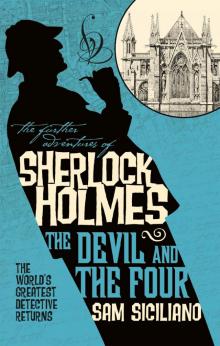 The Further Adventures of Sherlock Holmes--The Devil and the Four
The Further Adventures of Sherlock Holmes--The Devil and the Four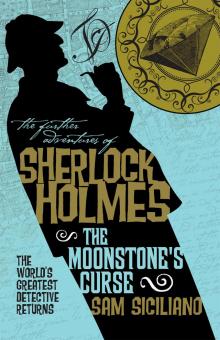 The Moonstone's Curse
The Moonstone's Curse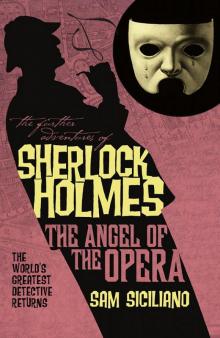 The Angel of the Opera
The Angel of the Opera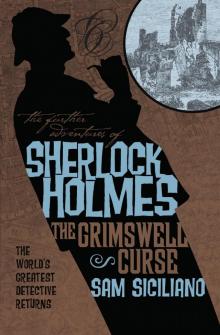 The Grimswell Curse
The Grimswell Curse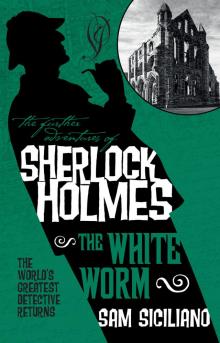 The White Worm
The White Worm